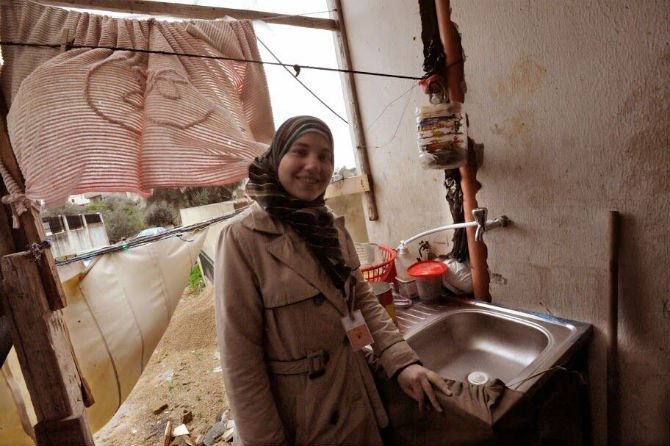Since my childhood, I have pursued a life of good health. I have enjoyed eating nourishing foods, playing sports, singing songs, writing and drawing. They are a part of my weekly routine. Each can contribute to our happiness while promoting a better quality of life. My pursuit of a well-balanced life inspired me to seek a background in public health and eventually join an organization that promotes peoples’ wellbeing. It made sense for me to join CARE in promoting the health of those who are particularly vulnerable. As a community mobilization assistant with CARE International in Lebanon, I ensure the conditions of water and sanitation in refugee households is safe. Usually, my work focuses on promoting health and hygiene, until recently, when I encountered something different.
It was a cloudy, cold day at a village in Zgharta, Tripoli (North Lebanon) where I was assessing household sanitation needs. Suddenly, I heard a voice calling my name: “Maryah." My colleague, Mona, was waving to me. “Could you please talk to this woman over here?” said Mona, “She needs you.” As I approached them, I saw a woman with the saddest face, anxious and miserable. Without any greeting, she asked me to look at her house, which was only a small shelter unit. “I have three teenage girls and I am so scared,” the woman explained. “There is only one latrine which is outside our house. A lot of strange men access this latrine and the door cannot be safely locked. My girls are always shy and scared to go in there. Please help my girls!”, she cried. Hearing this, I was deeply troubled. Before this, I had never been that grateful for the bathroom in our family home. For this woman, though, the lack of privacy was a serious protection issue for her daughters.
We are surrounded by blessings that we don’t even think about. If I didn’t notice this simple blessing – an indoor latrine - I can only wonder what else I have missed. Surely there are so many others that I have also passed unaware.
This poor woman who had approached us – she and her family needed our help. She wanted our assistance in helping her better protect her daughters. The girls were at high risk of sexual harassment. Strange men were entering the latrine every day without supervision. The dignity of the girls and their mother needed to be preserved. The solution was clear: to build a latrine with proper barriers in a technically suitable area inside the house. It is important for the latrine to be inside the house so that only members of the house can access it and not strangers. During my follow-up visit, my colleague Mona once again called me over to speak with the woman. This time, the weather was cold, but sunny. As I approached, I saw a smile that stretched from cheek to cheek. Without any greeting, the woman initiated the conversation with two words: “thank you." Now, her family enjoys the basic right of having a safe latrine, and inside their shelter. My experience with CARE and the humanitarian sector has transformed me into a person who appreciates her blessings, big and small. Most of all, I realized that I was not fully human until I learned to empathize and better understand the pain of others.

This article was written by Maryah Damlaj, Community Mobilization Assistant, CARE International in Lebanon.
More than 4 million refugees have fled the ongoing Syrian conflict, with 7.5 million others displaced internally - the highest number of refugees in a single crisis in over 25 years.
CARE has already reached over one million of those impacted in Jordan, Lebanon, Turkey, Egypt, Yemen, and inside Syria. Learn more here.